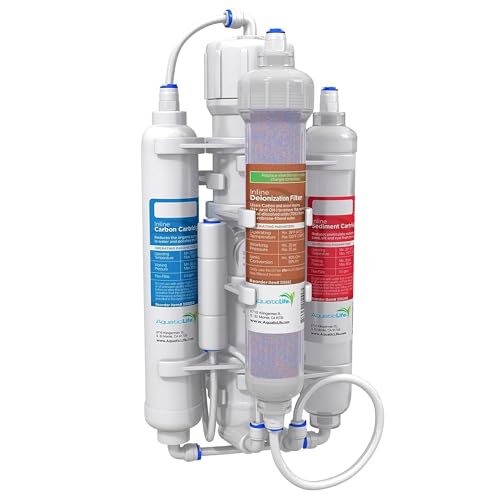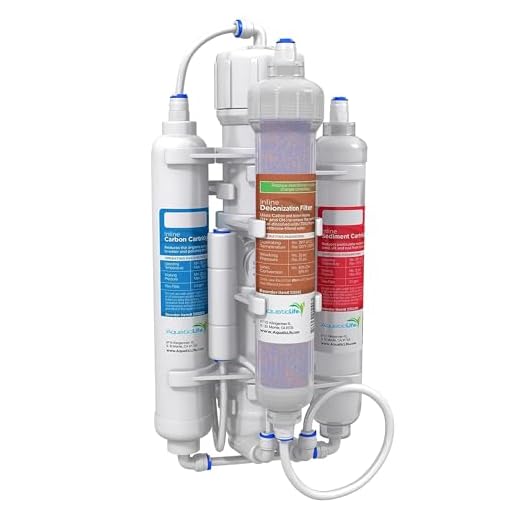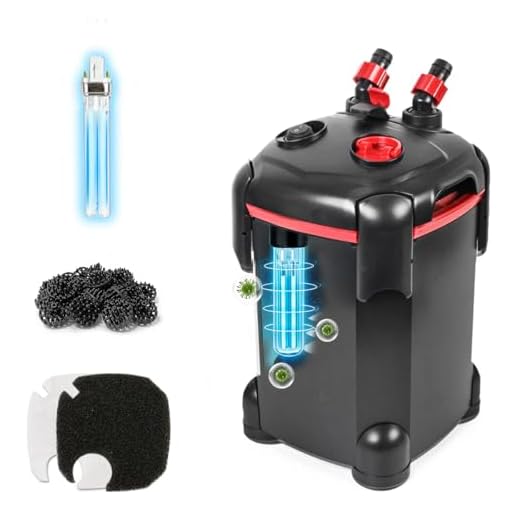Reef
Blog
What kind of water to put in fish tank

Choosing the right type of water to put in your fish tank is crucial for the health and well-being of your fish. While tap water may be convenient, it can contain chemicals, such as chlorine and chloramine, that are harmful to fish. Therefore, it is important to treat tap water before adding it to your aquarium.
One of the options for treating tap water is to use a dechlorinator, which neutralizes chlorine and chloramine. This is especially important if you have sensitive fish or invertebrates in your tank. The dechlorinator should be added to the water according to the instructions on the product.
Another alternative is to use distilled or reverse osmosis (RO) water. These types of water have had impurities removed and are generally safe for fish. However, they may lack some essential minerals that are beneficial for fish health. In this case, it is advisable to add a mineral supplement to the water.
It is also worth considering the specific needs of your fish. Some fish species, such as African cichlids, require water with a specific pH and hardness. It is recommended to research the water requirements of your fish species and adjust the water accordingly.
Tip: Regular monitoring of the water parameters, such as pH, ammonia, and nitrate levels, is essential to ensure a healthy and stable environment for your fish.
In conclusion, the choice of water for your fish tank depends on various factors, including the presence of chemicals in tap water, the needs of your fish species, and the desired water parameters. Treating tap water with a dechlorinator or using distilled/RO water are both viable options, but additional measures may be necessary to provide your fish with the necessary minerals and optimal water conditions.
Why Water Quality is Important for a Fish Tank
Creating and maintaining a healthy environment for your fish is crucial to their well-being. One of the key factors that contribute to a fish’s overall health is the quality of the water in their tank. Poor water quality can lead to a range of issues, including stress, disease, and even death. Therefore, it is important to understand why water quality is an essential aspect of fishkeeping.
Suitable pH Levels
The pH level of the water in your fish tank is a critical factor to consider. Different fish species thrive in different pH ranges, so it is crucial to research the specific needs of your fish. Maintaining the appropriate pH level helps to ensure that your fish can efficiently absorb nutrients, reduces stress, and promotes overall good health.
Adequate Ammonia Levels
Ammonia is a waste product produced by fish through their respiration and excretion processes. In high concentrations, ammonia becomes toxic to fish and can cause severe health problems. Therefore, it is essential to monitor and control ammonia levels in the fish tank by regularly testing the water and conducting partial water changes. Ensuring low ammonia levels is crucial for the long-term health and survival of your fish.
Regular Water Testing
Regular water testing is essential to maintain optimal water quality. It allows you to monitor parameters such as ammonia, nitrite, nitrate levels, and pH to ensure they are within the appropriate range for your fish species. Testing kits are readily available at pet stores and online, making it easy for you to keep an eye on the water quality and take immediate action if any parameters are amiss.
Proper Filtration and Water Changes
The primary function of a filter in a fish tank is to remove toxins, waste, and other impurities, helping to maintain a healthy environment. Regular water changes, typically around 10-20% of the tank volume, also help to reduce the accumulation of pollutants and ensure the removal of excess nutrients, promoting a stable and balanced ecosystem.
In conclusion, maintaining proper water quality in your fish tank is crucial for the health and well-being of your fish. By researching and understanding the specific needs of your fish species, regularly testing the water, and taking appropriate action, you can provide them with a clean and healthy environment to thrive in.
Choosing the Right Water for Your Fish Tank
When setting up a fish tank, one of the most crucial factors to consider is the type of water you should use. The quality of the water plays a crucial role in the overall health and well-being of your fish. Here, we will discuss the different types of water commonly used in fish tanks and help you make the right choice for your aquatic pets.
Tap Water
Tap water is the most accessible and convenient water source for many fish tank owners. However, before using tap water, it is important to treat it properly to make it safe for your fish. Tap water often contains chlorine, chloramines, heavy metals, and other chemicals that can be harmful to fish. Using a water conditioner or dechlorinator is essential to neutralize these harmful substances and create a fish-friendly environment.
Well Water
Well water is another option to consider for your fish tank. If you have a private well, the water may be free from chlorine and chloramines, making it safe for fish. However, well water can contain high levels of minerals, such as calcium and magnesium, which can lead to hard water conditions. Testing the mineral content of your well water is crucial to ensure it is suitable for your specific fish species. In some cases, well water may require additional treatment or dilution to provide optimal conditions for your fish.
Reverse Osmosis (RO) Water
Reverse osmosis (RO) water is a purified form of water that has had impurities and minerals removed through a filtration process. This type of water is ideal for fish tanks as it provides a blank canvas for maintaining the desired water parameters. However, keep in mind that RO water alone may lack essential minerals necessary for fish health. In such cases, it is recommended to mix RO water with tap water or use a remineralization product to achieve the ideal mineral balance.
Brackish Water
For certain species of fish, brackish water is necessary. Brackish water is a mix of freshwater and saltwater and requires precise salinity levels. If you plan to keep brackish water fish, it is essential to research their specific needs and create the right environment by adding the appropriate amount of marine salt mix to your water.
Conclusion
Choosing the right water for your fish tank is essential for the health and well-being of your fish. Consider factors such as tap water quality, mineral content, and the specific needs of your fish species before making a decision. Always use a water conditioner or dechlorinator when using tap water, and regularly monitor the water parameters to ensure a safe and healthy habitat for your aquatic pets.
Understanding Water Parameters for a Healthy Fish Tank
Keeping a fish tank healthy and thriving requires the right water conditions. Understanding the various water parameters is crucial for the well-being of your aquatic pets.
pH Level: The pH level of the water refers to its acidity or alkalinity. Different species of fish have different pH preferences, so it’s important to research the specific needs of your fish. pH levels can be adjusted using pH buffering chemicals or through natural methods like driftwood or crushed coral.
Ammonia: Ammonia is a toxic compound that can build up in fish tanks. It is produced from fish waste, uneaten food, and decaying plant matter. Regular water testing is necessary to monitor ammonia levels. If ammonia levels are too high, it can be harmful to your fish. Regular water changes and proper filtration can help reduce ammonia levels.
Nitrite: Nitrite is produced as a byproduct of the breakdown of ammonia by beneficial bacteria in the tank. Like ammonia, high nitrite levels are toxic to fish. Nitrite levels should be regularly checked and kept at low levels. Water changes and the use of products that remove nitrite can be helpful in maintaining a healthy nitrite level.
Nitrate: Nitrate is a less toxic form of nitrogen compound compared to ammonia and nitrite. However, high nitrate levels can still be harmful, especially to sensitive fish or invertebrates. Regular water changes and the use of live plants or nitrate-removing products can help control nitrate levels.
Temperature: The temperature of the water is important for the overall health of your fish. Different species have different temperature requirements, so it’s essential to maintain the appropriate temperature range for your fish. Use a reliable aquarium thermometer to monitor the water temperature and adjust as needed.
Chlorine and Chloramine: Tap water often contains chlorine or chloramine, which can be harmful to fish. These chemicals should be removed from the water before adding it to the fish tank. Use a water conditioner to neutralize chlorine and chloramine and make the water safe for your fish.
Properly understanding and managing water parameters is crucial for the well-being of your fish. Regular water testing, proper filtration, and attention to your fish’s specific needs will help ensure a healthy and thriving fish tank.
The Benefits of Using Filtered Water in Your Fish Tank
When setting up a fish tank, one crucial decision you have to make is what kind of water to use. While tap water may seem like an easy and convenient option, using filtered water can provide numerous benefits for your fish and overall tank health.
1. Removal of Harmful Chemicals and Contaminants
Filtered water undergoes a purification process that removes harmful chemicals and contaminants that may be present in tap water. This includes chlorine, chloramine, and heavy metals, which can be toxic to your fish. By using filtered water, you create a healthier and safer environment for your aquatic pets.
2. Prevention of Algae Growth
Algae growth is a common issue in fish tanks, and it can lead to cloudy water and unattractive tank conditions. Using filtered water helps to prevent algae growth by eliminating excess nutrients that algae feed on, such as nitrates and phosphates. This allows for clearer water and a more aesthetically pleasing tank.
3. Balance of pH and Hardness Levels
Tap water can vary in pH and hardness levels, which may not be ideal for certain fish species. Using filtered water allows you to control and maintain consistent pH and hardness levels, ensuring optimal conditions for your fish. This is particularly important for sensitive or delicate fish species that require specific water parameters.
4. Reduction of Risk for Fish Diseases
Filtered water plays a role in reducing the risk of fish diseases. By removing impurities and maintaining water quality, filtered water supports the overall health of your fish. It helps to prevent common issues such as fin rot, bacterial infections, and stress-related diseases, leading to healthier and happier fish.
5. Enhanced Longevity of Equipment
Using filtered water can also extend the lifespan of your fish tank equipment, such as filters, heaters, and pumps. Tap water often contains sediments and minerals that can clog or damage equipment over time. By filtering out these impurities, you can ensure the longevity and efficiency of your equipment, resulting in cost savings in the long run.
In conclusion, opting for filtered water instead of tap water when setting up your fish tank can offer significant benefits. From the removal of harmful chemicals and contaminants to the prevention of algae growth and the maintenance of optimal water conditions, filtered water promotes healthier fish and a thriving aquatic environment. Invest in a good filtration system to ensure the well-being of your aquatic pets.
Question & Answer
What kind of water should I use in my fish tank?
You should use dechlorinated tap water or filtered water in your fish tank. It is important to remove chlorine and other harmful chemicals from the water before adding it to the tank.
Can I use distilled water in my fish tank?
Distilled water is not recommended for use in fish tanks as it lacks important minerals that fish need to thrive. It is best to use dechlorinated tap water or filtered water instead.
How do I dechlorinate tap water for my fish tank?
You can dechlorinate tap water for your fish tank by using a water conditioner or by letting the water sit out for 24-48 hours to allow the chlorine to evaporate. It is important to remove chlorine as it can be harmful to fish.
Can I use well water in my fish tank?
Using well water in a fish tank can be risky as it may contain high levels of minerals, such as iron or calcium, that can be harmful to fish. It is best to test the well water before using it and consider using a water conditioner to neutralize any harmful substances.
Is it necessary to use a water conditioner in my fish tank?
Using a water conditioner is highly recommended in a fish tank, especially if you are using tap water. A water conditioner helps to remove chlorine, chloramines, and other harmful chemicals from the water, making it safe for fish.
What kind of water should I use for my fish tank?
You should use clean, freshwater for your fish tank. It is important to dechlorinate the water before adding it to the tank to remove any harmful chemicals.






